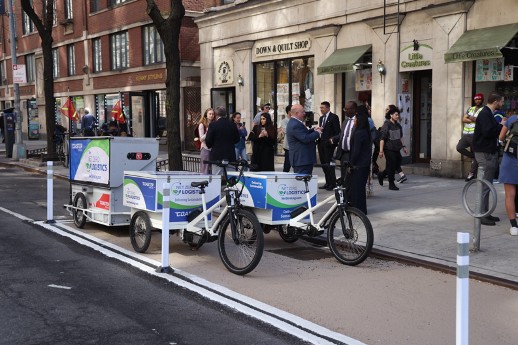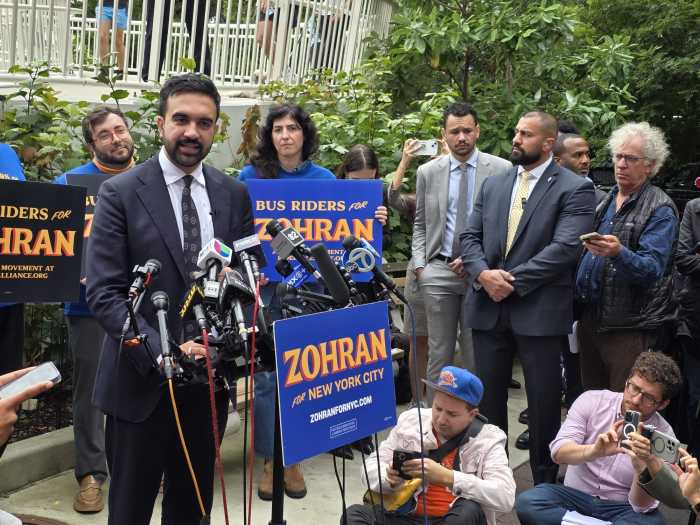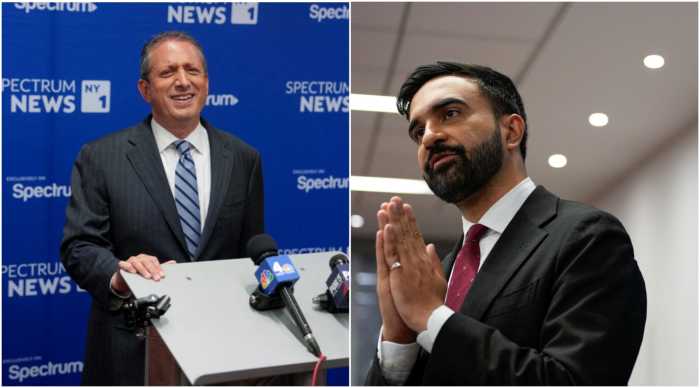Online shopping enthusiasts, take note: According to a new report released by the city Comptroller’s office on Monday, more deliveries leads to increased traffic crashes and poor air quality, prompting a call for stricter citywide safety regulations.
New Yorkers are buying more online, resulting in crowded streets, increased traffic crashes, and air quality issues, according to a new report published by the NYC Comptroller’s office. The report suggests that these issues can be addressed through specific city regulations and oversight on how deliveries are made during their last leg of travel.
NYC Comptroller Brad Lander’s deep-dive into NYC’s last-mile delivery routes, dubbed Fast Shipping, Slow Justice, found that after last-mile delivery facilities opened, 78% of nearby areas saw more injury-causing crashes, with injuries within a half-mile radius rising by an average of 16%.
Last-mile facilities are warehouses that companies such as Amazon and FedEx, use for sorting and dispatching packages to their final destinations. Delivery workers often use trucks, e-bikes that can hold cargo and hand carts to get their packages to customers in NYC.
In April, the NYC Department of Transportation opened several sustainable delivery hubs that allow trucks to drop off and transport goods via portable modes of transportation, including the cargo bikes and push carts.
Truck-related crashes around last-mile warehouses increased by 146% and truck-injury crashes rose by 137%, according to the report.
Last-mile warehouses pose a problem to air quality, too; 68% of these facilities are located in officially designated Environmental Justice Areas, including Maspeth, Red Hook, East New York and Hunts Point, the report states. Such areas are considered overburdened with pollution, poverty and/or a lack of public investment.
Unlike traditional or “middle-mile” warehouses, last-mile facilities are located in more densely populated areas, in proximity to customers’ homes and popular package destinations, according to Lander’s report.
“Fulfilling millions of orders each day requires thousands of truck trips, 24/7 operations, and large amounts of space to stock and sort through packages, especially as companies increasingly promise two-day delivery,” the report states. “The high volume of local deliveries has led to increased truck traffic and crashes, congestion, and air quality problems, particularly in communities designated as environmental justice priority areas.”
The report shows that between 2022 and 2024, many last-mile delivery facilities identified by the NYC Department of City Planning reported injuries to the Occupational Safety and Health Administration (OSHA) that totaled over 2,000 injuries.
Why are there so many problems with delivery service?
Daily package deliveries in NYC have significantly increased in recent years. Before the COVID-19 pandemic began in 2020, New Yorkers were getting around 1.8 million packages per day. However, in 2024, that number increased to approximately 2.5 million packages being delivered daily.
That is roughly one in three New Yorkers waiting for their parcels every day, according to the report.
Lander called his research a “wake-up call” for more rules and laws for the e-commerce delivery process.
“This report is a wake-up call,” Lander said. “Regulate delivery services or worsen street safety, environmental impacts, and workers’ rights. We cannot allow the benefits of e-commerce to come at the expense of limbs, lungs, and lives.”
Lander called for the NYC Council to pass the Delivery Protection Act, which would essentially create a licensing program with labor standards. He also urged the city to force warehouse operators to reduce truck emissions and establish a specific department to oversee the entire delivery industry.
“The convenience of next-day package delivery has a material cost for New Yorkers who pay with more traffic crashes, worsening air quality, and worker injuries,” the comptroller said.
Tom Gesualdi, president of Teamsters Joint Council 16, which has members who are freight drivers, supports at least some of Lander’s recommendations, even zeroing in on one big-name delivery giant
“Amazon doesn’t care about the well-being of New Yorkers,” Gesualdi said. “This company hides behind its DSP subcontracting model to dodge responsibility for worker safety. But they can’t hide anymore. The Delivery Protection Act will give our city the power to hold this corporate giant accountable.”
But Amazon told amNewYork in a statement that the report used “incomplete data and methods that seemed to reach conclusions determined from the start.”
Dannea DeLisser, spokesperson for Amazon, said the company holds both itself and its partners to high safety standards, noting that it also invests in safety enhancements and innovations.
“Safety is and will always be our top priority, and we’re committed to setting the benchmark for safety excellence across the industries where we work,” the spokesperson said. “While our work isn’t done, our metrics demonstrate meaningful safety improvements, reflecting our ongoing commitment to investing in advanced safety measures that protect our workforce and the communities where we operate. Additionally, all of our facilities are located in areas zoned for industrial or commercial activity by the city and operate in full compliance with city laws and regulations.”
Further, Amazon reps said the company’s branded e-bikes are capped at 12 mph, which is below the recently mandated 15 mph in NYC.
Meanwhile, Queens City Council Member Tiffany Cabán, the Delivery Protection Act’s sponsor, stated that the bill aims to shield workers from crashes and other risks associated with package delivery while pointing a finger — without naming — multi-billion-dollar online companies.
“We must deliver dignity to every worker who gets our packages from the warehouse to our doors,” she said. “We must deliver safety to every person who sets foot on the streets of New York. And we must deliver on the promise of New York as a city for all of us, a city where power lies with the people and the workers, where the safety of our streets and the cleanliness of our air is valued over the profits of billionaires and their big corporations.”
amNewYork contacted other e-commerce companies that provide delivery services in NYC, and is awaiting responses from each of them.






































